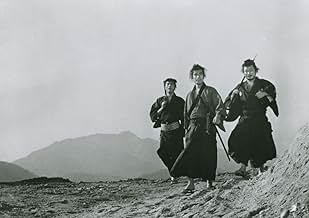Cuando unos campesinos pobres secuestran a la hija de un magistrado para obligarle a reducir sus injustos impuestos, un ronin errante decide ayudarles.Cuando unos campesinos pobres secuestran a la hija de un magistrado para obligarle a reducir sus injustos impuestos, un ronin errante decide ayudarles.Cuando unos campesinos pobres secuestran a la hija de un magistrado para obligarle a reducir sus injustos impuestos, un ronin errante decide ayudarles.
Argumento
¿Sabías que...?
- CuriosidadesHideo Gosha's directorial film debut.
- Citas
Sakon Shiba: [Threatening to kill the Magistrate; his daughter physically intervenes] For his victims' sake, I can't allow him to live.
Aya: Please!
Sakon Shiba: Move, or I'll kill you!
Aya: Kill me, then. No matter what he's done, I'm still his daughter.
Sakon Shiba: [the Magistrate breaks free and runs for it, but Shiba deftly cuts off his top knot with a quick thrust of his sword] Let the lord see you in disgrace. Let the peasants see you in disgrace.
- ConexionesFeatured in Best in Action: 1964 (2020)
I was entertained by this first part, and felt like I was settling in reasonably well into the world of this village where it seemed like a stand-off thriller involving samurai and peasants would take place.... and then the turning point happens where the Magistrate tries to give one of the peasants a taste of his own medicine (his daughter now under capture, plus a rape is more than implied), and this sort of trade-off of the two sides goes very poorly. But when Shiba tries to do the honorable thing - roving and Yojimbo-ish as he may be, he's still got a samurai's code of right and wrong - and take the brunt of the punishment, this also goes quite badly as the Magistrate turns out to be the villain of the story.
While Three Outlaw Samurai may draw in viewers based on the promise of a lot of action and thrills and blood (albeit in black and white, which has its own electrical charge as far as seeing what effect happens, and always these fights are scored without music to heighten the tension and realism), it's actually a story of politics, both in how the Magistrate has no compunction about being corrupt but, hey, let's make sure everything's set and proper for the (superior to him) Lord's arrival in a few days, while not giving a damn about anyone or anything, least of all his samurai code. It's here that Gosha is able, on his first outing as director (man what a debut!), to get a lot of substance out of what is a slim volume of a movie at 93 minutes. This is a samurai movie made by people who love samurai movies for samurai movie fans, if that makes sense; it's hard and cold and grisly for a lot of the time, and yet the hopelessness, the feeling that any one of our main samurai could die if they're not on the total alert (the Magistrate has his hired killers like out of, to be sure, an old western with the desperadoes coming after the good gunslingers), adds another level to things.
There may be a couple of nitpicks to have with a couple of the supporting players - the women in the film, more-so Oine than Aya but kind of both - are developed only up to a point, and Aya's character arc, while there, is kind of just in the backdrop (maybe a longer running time could've given her more to do, I don't know, she's an okay actress). Some of this may be a flaw with the writing too, or like that moment near the climax when (speaking of Star Wars again) the Han Solo-ish 'I'm leaving, no, wait, I'm going back to my friends' moment happens, which isn't unexpected, but Oine's reaction is really over the top. It wouldn't be so noticeable if everything else wasn't pitched at such a degree of realistic drama; it is theatrical, practically all of the performances, but I was struck by how Gosha made the suspense so moment-to-moment and beat-to-beat so that you never question the logic of how a characters gets out of something: it's all about who can possibly get the sword out faster and do the better/smarter move.
I loved the action in this film, from how it's shot to how the actors play off of one another, and there is character to it - how Shiba fights is different than Sakura, so while they have strong technique they are distinct too in how the characters approach fighting off the other swinging-swordsmen - and I loved these actors in these main roles. At times the tone of Three Outlaw Samurai is bleak and unsettling, but that is what makes it... sorry for the lack of a better phrase, but it's bad-ass. It's simply that: it all builds up to a ferocious climax where it's unpredictable how it'll turn out - I wasn't sure who might get away from the couple of dozen swordsmen out on the three's asses - and yet the substance of the story drew me in too, how these peasants react (or don't) to Shiba and his (anti)heroic movements. There's revenge, there's loyalty, there's death-defying strokes of heroism (maybe against better judgment) and all shot in shockingly good black and white photography that always has a purpose in every movement and cut.
PS: Some of the sword-fighting is, according to director Rian Johnson, a big inspiration for the upcoming Star Wars film The Last Jedi. Whether it's the Hidden Fortress or this, it's great to see Japanese cinema in the blood of sci-fi fantasy.
- Quinoa1984
- 19 mar 2017
- Enlace permanente
Selecciones populares
- How long is Three Outlaw Samurai?Con tecnología de Alexa
Detalles
- Duración1 hora 34 minutos
- Color
- Mezcla de sonido
- Relación de aspecto
- 2.35 : 1
Contribuir a esta página
































